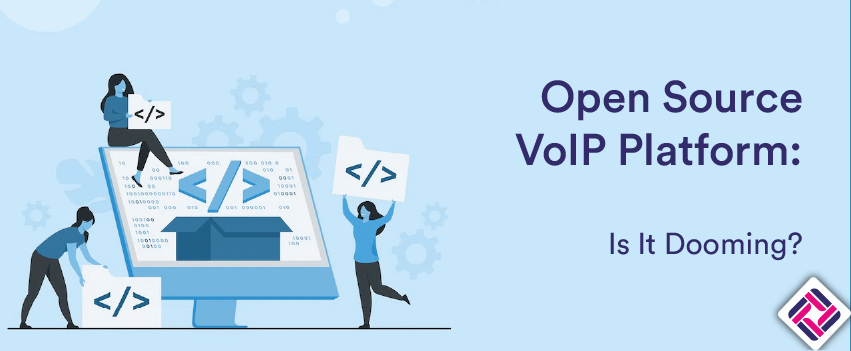VoIP is not a new term anymore. It has become an integral part of our lives. From end users to large enterprises, everyone uses the best VoIP Billing Solution platforms or VoIP based communication. Whether consciously or unconsciously, we all have used one or more VoIP platforms; from open source VoIP platforms to VoIP based calling mobile apps, IP telephony is benefiting everyone.
It is fine to not have detailed information about VoIP and its relevant terminologies if you are an end user, but if you are willing to integrate VoIP infrastructure or use any of the VoIP solutions like a class 4 Softswitch solution, multi tenant IP PBX, fax over IP software, calling card platform, etc., it is advisable to know at least basic terminologies related to voice over internet protocol (VoIP). Even if you are ready to outsource all your technical jobs to a leading VoIP development company, knowing the major terminologies and basics of VoIP can help you understand the services you receive from your provider company and increase ROI.
What is VoIP?
VoIP is an acronym for voice over internet protocol. It traverses voice packets over internet lines to enable telephony at cheaper rates.
Your Go-To Guide for Understanding VoIP Fundamentals.
In many cases, VoIP platforms are connected with other PSTN devices. In other cases as well, it is necessary to transform voice, which would be an analog signal into digital packets. The VoIP platforms will have a converter that will translate analog signals into digital packets and traverse them over internet lines. At the receiving end, it will again transform digital packets into analog signals to make it sound like a normal voice.
The Devices Uses in the VoIP Infrastructure
Different VoIP solutions use different VoIP devices in the VoIP infrastructure. For example, the telephony infrastructure for a class 4 Softswitch solution will be different from the infrastructure for a multi tenant IP PBX. There are some commonly used devices, which are briefly explained hereunder:
IP Phones
The IP phones look like traditional landline phones, but they will have more switches and more features. It can also support more feature rich communication. The IP phones will be connected directly to your desktop or laptop system or internet lines. It uses the internet to stay charged and provide communication services.
ATA (Analog Telephone Adaptor)
It is an amazing tool, which lets you use your existing telecommunication device to make VoIP calls. ATA adaptor will let you connect your PSTN landline phone to the computer and use VoIP telephony features. This device will help in converting analog signals into digital packets.
Computer to Computer or App to App
This helps you make calls from your desktop or laptop to another desktop or laptop with the right VoIP software, which can be proprietary or open source VoIP platforms. With the help of smartphone devices, app to app aka mobile to mobile calling with the right app. PC dialer is an example of computer to computer calling and a mobile SIP dialer is a classic example of app to app calling software.
Some More VoIP Terminologies and Basics You Must Know
VoIP Implementation Types:
The VoIP software can be installed and deployed using two different methods.
1. On-premise
The VoIP infrastructure to make calls and use a VoIP platform such as a VoIP billing software solution or a class 5 Softswitch solution will be deployed and set up on your office premise.
2. Hosted solution
Hosted VoIP platforms will be hosted on the cloud or office premise of your service or software provider such as ASTPP. Usually, hosted solutions will be available as a rented solution offered by the VoIP service providers. For example, a hosted calling card platform will be hosted on the cloud of your provider and you can use it from anywhere.
Types of VoIP Platforms
1. Open Source VoIP Solution
An open source platform will have a general public license (GPL) according to which you can use this software for free without spending a penny. The code of this VoIP Billing Solution Software will also be available for free to let you make the required customization and even use a white label software.
2. Proprietary Solution
A proprietary solution will be owned by your provider. You need to pay the license fee of the software to use it. You will not get the code of the software, but you can get customization by paying an additional fee for customization.
3. VoIP Development
It is another approach to getting a VoIP Billing Software Solution. The VoIP development company will provide your VoIP development services to build your software. For example, if you want to use a fax over IP software solution, you can get it developed by the company. You will get the code of the software and a 100% white label solution. However, this can be an expensive software solution.
How to Get the Best VoIP Billing Software for Your Business?
1. Define Your Communication and Business Needed
The first step to getting the best software is to define business and communication needs. As mentioned earlier, there are different types of VoIP Billing solutions available, so make a list of features you are expecting to have in your VoIP Billing solution.
2. Define Your Budget
Once you have defined the features, the next step is defining your overall budget to acquire an IP telephony platform. You may need to reduce the feature list to fit the software purchase in your budget.
3. Partner With a VoIP Software Provider
Once the budget and feature list is defied, you can find your partner. The open source VoIP solutions are often affordable and customizable. The provider will help in defining the architecture, development model, etc.
Concluding Notes
These are the basics of VoIP that you must know to find the right provider, right VoIP software and then use it in your favor. The VoIP dictionary is huge and has many other terms related to it. But, what we have discussed in this article is the most important term for businesses that want to use the VoIP platforms at their best.
Are you looking for a reliable partner?
We have one of the most popular open source VoIP platforms that provide various VoIP solutions and smart telephony.





